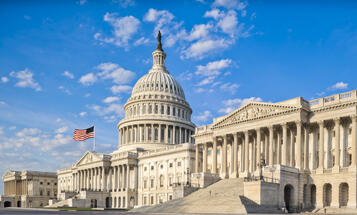
Amid Funding Crisis White House Requests 16B For Childcare
Spending on our collective well-being helps people keep a roof over their heads, feed their families, and help grow our overall economy.

Congress currently has an opportunity to support families and children across the country, but it remains to be seen if federal legislators have the political will to act. Recently, the Biden-Harris Administration requested $16 billion to extend critical childcare funding for another year. As part of a broader domestic funding supplement, this funding is a first step to address the urgent childcare crisis in the U.S.
Congress has an opportunity to sustain childcare access.
Now—with several key spending deadlines rapidly approaching, including the looming deadline to fund the government—Congress has an opportunity to sustain childcare access. But harmful and selective anti-spending rhetoric in Congress may bar funding, robbing children and families of needed care. It also deprives childcare workers and our local economies of desperately needed support. Despite the clear and dire need, a debt and deficit-obsessed conservative conference championed by a new Speaker of the House with an austerity-filled track record continues to signal an unwillingness to make the investments we need.
We’ve seen the power and impact of government investment in our families and communities. Passed in March of 2021, the American Rescue Plan Act (ARPA) provided $24 billion in childcare stabilization funding, helping to keep the doors open at over 8 out of every 10 licensed childcare centers across the country. Unfortunately, that funding expired on September 30th of this year.
Two years after APRA, our families and communities still have an urgent need for childcare. And already, just a month after ARPA funding expired, centers have begun to close. Without immediate action, an estimated 70,000 childcare programs are in danger of closing. This jeopardizes the care of over 3 million children, making childcare even more expensive and difficult to access, especially for Black and brown households.
Notably, the childcare crisis had a disproportionate impact on Black and brown women, who are more likely to work in childcare industries and face heightened barriers to accessing childcare compared to their white counterparts.
Even before the COVID-19 pandemic, communities struggled with access to affordable childcare. Government funding consistently fell short of guaranteeing accessible childcare that supports a comfortable standard of living for all households. Notably, the childcare crisis had a disproportionate impact on Black and brown women, who are more likely to work in childcare industries and face heightened barriers to accessing childcare compared to their white counterparts. This dynamic was laid bare during the height of the pandemic, exposing long-existing inequities across race, gender, and socioeconomic status.
Despite claims of “excessive spending,” the United States spends less than 0.5 percent of GDP on early childhood education and care. This is an absolutely paltry amount compared to other comparable countries. The same is true for other critical social infrastructure investments. Spending on our collective well-being helps people keep a roof over their heads, feed their families, and help grow our overall economy.
We need Congress to expand public investment in the true engine of our economy: our people.
Now is the time for a unified chorus to demand better and reject conservative anti-spending rhetoric that keeps us all down. We need Congress to expand public investment in the true engine of our economy: our people. The Biden-Harris Administration’s domestic supplemental request is an essential step in the right direction to do just that.




